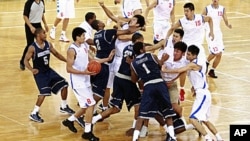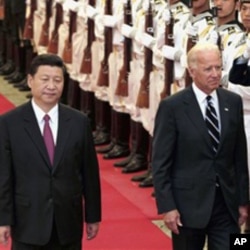A brawl during what was supposed to be a friendly U.S.-China basketball match is threatening the positive image Washington and Beijing are trying to create during Vice President Joe Biden’s visit to China.
The purpose of the exhibition basketball match was to foster goodwill. Instead, online videos of the game showed an all-out brawl between the two teams - the Georgetown Hoyas and the Bayi Rockets.
Amateur video footage showed a bench clearing melee in the fourth quarter with the score tied. Players from both teams punched and kicked each other. The game was then called off. As the Georgetown team walked off the court, video showed spectators booing and a few throwing cups at the players.
Brook Larmer wrote a book on China’s best known basketball player, called “Operation Yao Ming.” He was not at the contentious match, but saw video afterwards.
“I don’t want to get too involved in a partisan fight or discussion, but I think the Chinese team was unbelievably quick to jump off the bench," he said. "The precipitating incident was an elbow, an elbow from one of the Georgetown guards. You have to take into account that this happened after lots and lots of pushing and shoving, and name calling, and trash talking, and even a Chinese player getting in the face of the American coach."
Georgetown is a University team from Washington D.C. The Bayi Rockets of Shanghai play in the Chinese Basketball Association, China’s top professional league.
Larmer notes that the Bayi Rockets is the People’s Liberation Army’s team and used to be the centerpiece of the Chinese government’s state-run sports system.
“Basketball was one of their [PLA’s] last [sports] strongholds and they’ve faded from the limelight, and now they’re just a middling team that has a reputation for being a little overly pugnacious,” Larmer explained.
Thursday night’s brawl took place at the same time visiting Vice President Joe Biden was across town banqueting with his Chinese counterpart, Xi Jinping, who is expected to become China’s next president. The two countries have been working hard to present the relationship as a very good one.
Larmer points to the chaos as a wasted opportunity to build better ties through sport - in which basketball diplomacy could have replaced ping pong diplomacy.
“You don’t want to say that it’s a metaphor for U.S.-China relations, because it certainly isn’t, but it does bespeak some of the tensions underlying these games that are supposed to be just friendly,” he added.
Larmer says he is concerned by what he describes as “a disturbing trend” of more violence in Chinese basketball games - both within the national league and supposedly friendly matches with players from other countries.
Chinese players fought even more violently last year, in a goodwill match against a team from Brazil. Following the dust-up with the Brazilian team, some of the Chinese team’s coaches were fined and the players sent to sportsmanship classes, but, as Larmer notes, no player was suspended.





